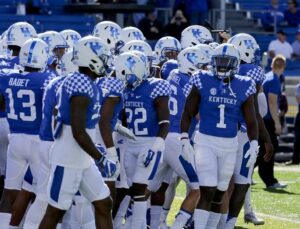The Future of Sports Betting in the United States: A Look Ahead to 2024
Share This Tags The landscape of sports betting in the United States has undergone significant changes since the U.S. Supreme Court cleared the way for states to legalize it in 2018. Over the past few years, many states have embraced this new form of gambling, reaping substantial tax revenues from the billions of dollars wagered on sports. However, there are still a dozen states where sports betting remains illegal, and the odds of further expansion in 2024 appear uncertain due to various obstacles and competing interests.
The landscape of sports betting in the United States has undergone significant changes since the U.S. Supreme Court cleared the way for states to legalize it in 2018. Over the past few years, many states have embraced this new form of gambling, reaping substantial tax revenues from the billions of dollars wagered on sports. However, there are still a dozen states where sports betting remains illegal, and the odds of further expansion in 2024 appear uncertain due to various obstacles and competing interests.
As of now, sports betting is illegal in Alabama, Alaska, California, Georgia, Hawaii, Idaho, Minnesota, Missouri, Oklahoma, South Carolina, Texas, and Utah. These states have faced multiple hurdles preventing the legalization of sports betting within their jurisdictions. According to Becca Giden, policy director at Eilers & Krejcik Gaming, the remaining states have “multiple obstacles” that have prevented them from joining the growing list of states that have already legalized sports betting.
Two of the most populous states in the country, California and Texas, are considered the biggest prizes for sports bettors. However, the prospects of legalizing sports betting in these states in 2024 seem unlikely. In California, voters overwhelmingly rejected two rival sports betting initiatives in the previous year, leading to divisions among online gaming companies, tribal casinos, and horse tracks. Similarly, Texas faces challenges as the state legislature is not in regular session in 2024, making it difficult to place citizen initiatives on the ballot.
The road to legalizing sports betting in these remaining states is filled with obstacles and competing interests. In Minnesota, for example, achieving bipartisan support in the Senate is crucial for the authorization of sports betting. Lawmakers have struggled to resolve differences between tribal casinos, which seek exclusive rights over online and in-person sports betting, and horse racing tracks, which also want a larger share of the gambling market. Despite the challenges, Democratic state Sen. Matt Klein remains optimistic, stating that “the moment is now” for tribes in Minnesota.
Missouri is another state where efforts to legalize sports betting have repeatedly stalled. Republican Sen. Denny Hoskins insists that any legalization efforts must address the regulation of slot-machine-style video games that have been operating in convenience stores and truck stops. This demand has created tensions between casinos and online sports wagering companies, further complicating the legislative process. The St. Louis Cardinals and other professional sports teams are also pushing for an initiative petition to put sports betting on the November ballot, but the prospects for success remain uncertain.
The demand for sports betting in states where it remains illegal is evident. Data from technology firm GeoComply Solutions shows that thousands of Missourians attempt to access mobile sports betting sites in neighboring states like Kansas and Illinois. The ease with which people can cross state borders to place their bets highlights the potential economic activity that states like Missouri may be missing out on. In fact, other states have already reaped significant tax revenues from sports betting, with over $4 billion collected from more than $280 billion wagered since 2018.
Although the prospects for sports betting expansion in 2024 may seem uncertain, there are a few states that could potentially join the ranks of those that have already legalized it. Georgia, with its openness to legalize sports betting expressed by Republican Gov. Brian Kemp, may be one of the most likely candidates. Despite previous setbacks when the Senate rejected a proposed constitutional amendment, there is still a possibility of leveraging sports wagering to also legalize casinos and horse racing.
Alabama, on the other hand, would require a constitutional amendment approved by voters to legalize sports betting. Efforts to expand gambling beyond tribal casinos, dog racing tracks, and charitable bingo operators have so far been unsuccessful. However, Republican state Sen. Greg Albritton is confident that the issue will be debated in the legislature this year, suggesting a potential breakthrough.



 2024-01-05
2024-01-05















